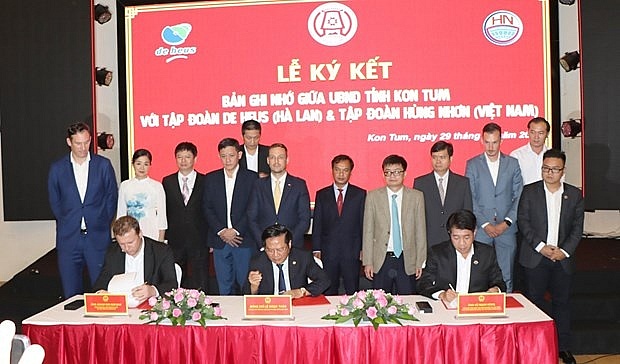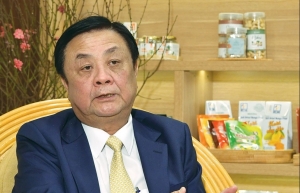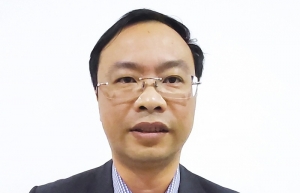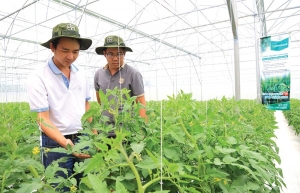Positive goals set by livestock groups
Dutch-backed De Heus Group and Vietnam’s Hung Nhon Group are eager to implement provisions for an MoU that the two parties signed in December. Accordingly, in 2023 they are aiming to accelerate cooperation to develop projects in agriculture such as livestock and poultry farming as well as animal feed production, and set up high-tech agricultural production sites based on the Dutch cooperative model in Vietnam.
 |
| Dutch-backed De Heus Group and Vietnam’s Hung Nhon Group are eager to implement provisions for an MoU that the two parties signed in December, At the event. (Photo:VNA) |
Hung Nhon will be responsible for investing in large modern livestock farms, while its strategic partner will provide international-standard wine and poultry genetics.
In the short term, Hung Nhon and De Heus will expand its complex high-tech agricultural models in the Central Highlands provinces of Dak Nong and Kon Tum, following three existing complexes in the nearby provinces of Gia Lai, Dak Lak, and Lam Dong.
By 2030, the two parties target achieving a capacity of 7,500 gilts in the Central Highlands region, 30,000 sows in the southeast and south-central regions, and 25 million broiler chickens in the southern province of Tay Ninh.
Vu Manh Hung, chairman of the board at Hung Nhon, said that though the agricultural sector always faces risks from weather and diseases, the group still saw large room for growth. During the past 10 years, the sector’s average growth was between 4 and 6 per cent per annum.
Meanwhile, Vietnamese conglomerate Thaco Group has released specific targets its Thaco Agri arm. The group will spend $356.5 million to develop Thaco Agri, which expects more to have more than 100,000 cows and 215,000 pigs by the end of this year. It also expects $422.5 million in revenues in 2023. Thaco Agri has formed integrated and circular agricultural production complexes, including fruit tree cultivation, animal husbandry, and processing.
Ministry of Agriculture and Rural Development (MARD) statistics have showed that in January, livestock production reached $30 million, up 14.5 per cent on-year.
In terms of export value, livestock is a rare sector seeing growth in the first month of 2023. Meanwhile, the agro-forestry-fishery sector’s export value reached $3.73 billion, down 23.6 per cent. Of which, the export value of main agricultural products is $1.76 billion, seafood $600 million, and forest products $1.19 billion, a decrease of 12.7, 30.9, and 30 per cent, respectively.
In 2023, the livestock sector is expected to continue to increase in production value by 5.5-6 per cent. The total output of live animals for meat is forecast to reach about 7-7.5 million tonnes.
Analysts at VNDirect Securities believed that difficulties for pork producers will ease this year, thanks to the forecasted pork price increase of 5 per cent when demand for eating out recovers. In addition, grain prices are likely to fall as exporting countries increase supplies, Ukraine’s grain goods can be shipped again after the agreement to end the blockade of its ports, and fertiliser prices cool.
According to VNDirect, although Vietnam’s animal feed prices are trailing world agricultural prices, feed costs will still decrease gradually in 2023.
Although an outbreak of African swine fever has yet to fully controlled on household farms, it will not affect the total pork supply. This outbreak is not as severe as past versions, and vaccination deployment is expected to begin in 2023 after more trials.
Deputy Minister of Agriculture and Rural Development Phung Duc Tien said as of January, more than 300,000 ASF vaccine doses were being used for conducting narrow-scope tests. Vaccinated pigs have met immunity criteria and no incidents have yet been reported. The MARD expects to start vaccinating livestock on a larger scale by July.
Tien assigned the Department of Animal Health to coordinate with the production unit to closely monitor several groups of problems related to the vaccine to ensure a stable, immune-responsive, and sterile vaccine. This month, Tien also required the department to invite the agricultural company Dabaco to report on the production process of the ASF vaccine, which failed to debut last year as hoped.
 | The pride of agricultural backbone Vietnam’s agriculture has reaped many achievements last year. Minister of Agriculture and Rural Development Le Minh Hoan writes about how the sector will continue sailing forward in the new year. |
 | Agriculture remains backbone of Vietnamese economy Duong Manh Hung, director of the Agriculture, Forestry, and Fisheries Statistics Department, under the General Statistics Office, said although Vietnam strives to be a country with a modern industrial base and upper-middle income status by 2030, agriculture has always remained the backbone of the national economy. |
 | Agriculture can be driver to attract overseas funds Vietnam is expanding international cooperation as an effective solution to reach its target of attracting $25 billion in foreign investment in the agricultural sector by 2030. |
What the stars mean:
★ Poor ★ ★ Promising ★★★ Good ★★★★ Very good ★★★★★ Exceptional
Related Contents
Latest News
More News
- SK Innovation-led consortium wins $2.3 billion LNG project in Nghe An (February 25, 2026 | 07:56)
- THACO opens $70 million manufacturing complex in Danang (February 25, 2026 | 07:54)
- Phu Quoc International Airport expansion approved to meet rising demand (February 24, 2026 | 10:00)
- Bac Giang International Logistics Centre faces land clearance barrier (February 24, 2026 | 08:00)
- Bright prospects abound in European investment (February 19, 2026 | 20:27)
- Internal strengths attest to commitment to progress (February 19, 2026 | 20:13)
- Vietnam, New Zealand seek level-up in ties (February 19, 2026 | 18:06)
- Untapped potential in relations with Indonesia (February 19, 2026 | 17:56)
- German strengths match Vietnamese aspirations (February 19, 2026 | 17:40)
- Kim Long Motor and AOJ Suzhou enter strategic partnership (February 16, 2026 | 13:27)

 Tag:
Tag:




















 Mobile Version
Mobile Version